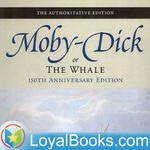Moby Dick by Herman Melville
“Call me Ishmael” is one of the most famous opening lines in American literature. With these words, opens one of the strangest and most gripping stories ever written about the sea and sea-faring. Moby Dick by Herman Melville is today considered one of the greatest novels written in America but paradoxically, it was a miserable failure when it first made its debut in 1851. Entitled Moby Dick or The Whale the book finally got its due after the author’s death and is now regarded as a classic portrayal of mania and fatal obsession.
The narrator, Ishmael, travels to New Bedford, Massachusetts, to find a place on a whaling ship. He lodges at a seedy inn where he is forced to share a room with a strange old character, Queequeg, who was a harpooner. Despite his initial revulsion of Queequeg, Ishmael decides to join him in looking for work together. They reach Nantucket, the traditional center of whaling, where they find a berth on the Pequod, a bizarre vessel adorned with the skeletons and teeth of whales. The captain, Ahab, a mysterious figure, does not appear immediately. Later, they come to know that he is on board, recovering from losing a leg on his last voyage having escaped death narrowly following an encounter with a massive sperm whale.
As the ship sails past Africa, Ahab’s sinister motives begin to emerge. His agenda is to hunt and destroy a legendary whale named Moby Dick, whom he has unsuccessfully pursued several times. He has smuggled his own private harpooners on board and he accosts every whaling ship he meets and demands information about sightings of Moby Dick. One of the ships has a maniacal passenger called Gabriel, who claims to be a prophet and he predicts doom for anyone who seeks Moby Dick. The peg leg captain finally encounters Moby Dick and a trail of destruction follows. The obsessed Ahab refuses to give up. The novel then races towards a brilliant and dramatic climax.
As an example of the Great American Novel, Moby Dick is unrivaled in its structure, language and style. Melville amalgamates a fabulous mix of Biblical, Shakespearean and mythical elements along with wonderful seafaring atmosphere sourced from his own nautical experiences on board whaling schooners. Whaling stories from contemporary sources in Nantucket’s local grapevine was another rich fountainhead of material.
Moby Dick has been adapted for stage, radio, screen, television, comics and graphic novels. It remains a strange and unforgettable classic which no reader should miss.
© 2025 LoyalBooks.com · more info
Artwork and data is from the podcast’s open RSS feed; we link directly to audio · Read our DMCA procedureListen and follow
Information for podcasters
- Podcast GUID:
31b7934f-b5f2-5cb7-a142-b7a341ba40b6 - This podcast doesn’t have a trailer. Apple Podcasts has a specific episode type for a trailer, which also gets used by many other podcast apps: but there isn’t one correctly marked in the RSS feed from the host.
- The audio of this podcast has an HTTP address, and not HTTPS. If it isn’t also available as HTTPS, it is no longer playable in any embedded player on an HTTPS site in Google Chrome.
- This podcast’s RSS feed is not secure. Apple may require this in future.
- This podcast appears to be missing from Spotify. We list all the podcast directories to be in.
- See this podcast’s listener numbers, contact details and more at Rephonic
- Validate this podcast’s RSS feed with Livewire, Truefans or CastFeedValidator
